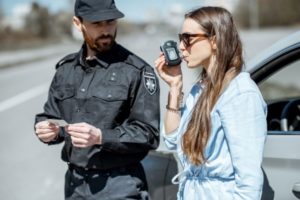
The government has a high burden it must meet before a judge or jury can find you guilty of drunk driving. One possible defense to a New Mexico DUI offense involves false positive readings from breath test machines.
The Importance of Procedure in a DUI Case
When it comes to criminal offenses, the United States and New Mexico constitutions require law enforcement—including both police officers and prosecutors— to follow the proper procedure when investigating and prosecuting a crime. Everything a police officer does from the moment they flip on their lights and sirens to the point when you are arrested is important.
In many criminal cases, including some DUI cases, the most important procedural aspects of an arrest relate to the officer’s conduct in stopping you. For example, did they have the legal authority to pull you over? To ask you to take a breath test? To search your car? However, procedure is also critical to the collection and preservation of evidence. This is where false positive readings from a Breathalyzer machine can come into play.
What Is (and What Isn’t) a Breathalyzer?
A Breathalyzer is a machine often used by law enforcement to determine if a driver is under the influence of alcohol. Notably, Breathalyzers do not actually provide a reading of someone’s blood alcohol content because this would require a blood test. Instead, Breathalyzers provide an indirect estimate of a driver’s blood-alcohol content by measuring the amount of alcohol in the driver’s breath.
There are two types of Breathalyzers: the small, hand-held machines that police officers use during a DUI stop, and larger, more accurate machines at the police station.
Portable Breathalyzers are not accurate enough to be admissible in court; however, if a test indicates the presence of alcohol, this gives the officer probable cause to arrest you. Additionally, refusing a roadside breath test does not count as refusing a chemical test, which can carry significant administrative penalties.
Typically, if an officer arrests you after administering a roadside breath test, they will take you to the police station to take another breath test or a blood test. Breath tests and blood tests conducted at a police station are admissible in court.
Five Causes of False Positive Readings
Breathalyzers are machines, and like all machines, they are subject to error. If you believe that a Breathalyzer returned a false positive reading, it may be based on one of the following.
You Are Taking Certain Medications
Some medications will either increase the amount of alcohol that registers on your breath or cause the Breathalyzer to incorrectly sense the presence of alcohol in your breath. For example, medications like Nyquil actually contain trace amounts of alcohol. Other medications, including oral pain relievers and asthma medication, can cause false positive readings.
You Recently Consumed Certain Food or Drink
Mouthwash contains a trace amount of alcohol. Thus, if you rinsed your mouth out with mouthwash as an officer was approaching your vehicle, the machine may have returned a false positive result. Other types of foods and drinks that can trigger false positive results include:
- Sugar-free gum,
- Hot sauces,
- Fermented drinks, such as kombucha,
- Energy drinks,
- Ripe fruit,
- Some types of bread, and
- Protein bars.
If you consumed any of these items before taking a breath test, it is possible that the reading was inaccurate.
The Officer Did Not Properly Calibrate the Machine
Breathalyzers are highly sophisticated machines that require regular maintenance to operate correctly. This regular maintenance includes ensuring that the device is calibrated properly. Most police departments require officers that operate Breathalyzers in a police station to undergo training to ensure they know how to correctly use and calibrate the machine. However, it is common for officers to either forget to calibrate the machine or make a mistake while doing so.
The Officer Administered the Test Too Soon After You Consumed Alcohol
It stands to reason that a Breathalyzer will return a higher result if you very recently drank alcohol. Thus, police officers should wait at least 15 minutes before asking you to take a breath test. If they don’t, you may be able to challenge the results because the likelihood of a false positive reading is much higher in these situations.
There Were Environmental Factors That Caused a False Positive Reading
Breathalyzers work best in controlled environments. However, most often, police officers use these machines either on the side of the road or in crowded police stations. In certain situations, the presence of environmental factors can cause false positive readings. For example, the fumes from an alcohol wipe used to sterilize the mouthpiece right before you blow into it could return a positive result. Other types of environmental factors that may have an impact on a Breathalyzer reading include:
- Paint fumes,
- Cleaning supplies, and
- Dust particles from a deployed airbag.
If you believe that external factors contributed to a false-positive reading, a dedicated New Mexico DUI charges defense attorney can help you challenge the results of the test.
Reach Out to the New Mexico Criminal Law Offices
If you are facing a New Mexico DUI offense based on what you believe to be a false positive reading, do not give up hope; you have options. The dedicated criminal charges defense legal team at the New Mexico Criminal Law Offices have decades of combined experience helping clients fight to keep inadmissible evidence out of court. We’ve successfully represented countless clients facing all types of DUI charges, including those involving questionable chemical test results. To learn more, and to schedule a free consultation, give us a call at 505-200-2983. You can also reach us through our online form, and one of our lawyers will be in touch.

